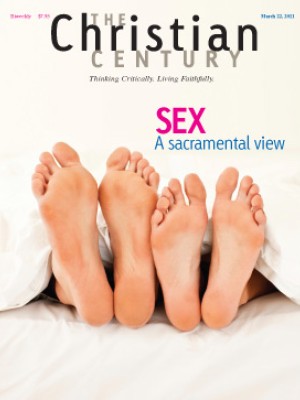Pro-union clergy voices enter Wisconsin debate
The pro-union rallies in Wisconsin have a retro feel to
them—particularly for people of faith. At one time clergy and
faith-based groups were on the front lines of the American labor
movement, but priorities shifted with the rise of the religious right
and the weakening of unions.
In the Wisconsin protests over
Governor Scott Walker's budget proposal that would reduce collective
bargaining rights for teachers and other public-sector employees,
however, religious voices have reentered the fray.
Groups like
Faith in Public Life and Interfaith Worker Justice have mobilized
coalitions that include Protestants and Muslims, in addition to
Catholics and Jews, who dominated pro-union efforts in previous
generations.
Clergy led invocations and prayer vigils throughout
Wisconsin, wrote letters and sent delegations to meet with Republican
lawmakers. An Illinois church and synagogue even offered sanctuary to
the 14 Democratic state senators who fled the state on February 16
rather than vote on the governor's bill.
Read our latest issue or browse back issues.
Walker says proposed
legislation that would limit collective bargaining rights is necessary
to close a $137 million deficit in the state's budget, a political
strategy that has since spread to statehouses in Indiana and Ohio. Union
supporters have responded with massive protests.
The U.S.
Catholic bishops on February 24 threw their moral weight behind the
pro-union protesters in Wisconsin, saying the rights of workers do not
abate in difficult economic times.
"The debates over worker
representation and collective bargaining are not simply matters of
ideology or power," said Bishop Stephen Blaire of Stockton, California,
chairman of the U.S. bishops' committee on domestic justice, "but
involve principles of justice, participation and how workers can have a
voice in the workplace and economy."
Pope Benedict XVI and his
predecessor, Pope John Paul II, were both ardent supporters of unions
and workers' associations, Blaire said.
Interfaith Worker Justice has compiled statements affirming the right to organize from more than a dozen denominations.
"We're
making this a bigger issue than just the workers involved. We're making
it a moral issue, and that it's more than just fighting over pensions,"
said Rabbi Renee Bauer, director of the Interfaith Coalition for Worker
Justice of South Central Wisconsin. "We're hoping that if lawmakers
hear from religious leaders, it'll help them have a change of heart."
While
some conservative Christians have used biblical language to oppose
labor demands, the traditional role of religion has been to support the
rights of workers, said Thomas C. Kohler, a Boston College professor of
labor law.
"Catholics and Jews have always taken the notion of
work as being far more than instrumental," he said. "As the rabbis
taught, God starts creation, but humans are given the gift of completing
it. Work is a holy thing."
David L. Gregory, executive director
of the Center for Labor and Employment Law at St. John's University,
agreed but said the blurring of lines between social and fiscal
conservatives has eroded some religious support for unions.
"Anybody
identified with the Judeo-Christian tradition is making a commitment to
[its] social justice dimension, but it depends on whether they're
operating primarily according to their faith or according to politics,"
Gregory said. "Many evangelicals have increasingly been moving to the
right side of the political spectrum."
The religion-labor bond
began to weaken during the Vietnam War and the civil rights conflicts of
the 1960s, Kohler said. Among Catholics in particular, political
efforts since then have focused on abortion and other "life issues," he
said.
By the time Interfaith Worker Justice formed in 1996, the
ties between religion and labor had all but unraveled, said Kim Bobo,
the group's founder and executive director. But as the economic downturn
has taken a toll on middle-class congregations, clergy have become more
aware of the need to protect fair wages and benefits. Bobo said her
Chicago-based group can mobilize those sentiments into action in
Wisconsin and other states considering union-busting budget measures.
"This
attack is so vicious and so wrong that we're seeing people step forward
to support workers, and it has galvanized people in the religious
community," she said. "It's a huge resurgence." —RNS





